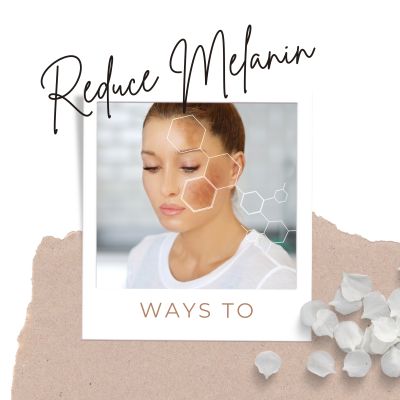To reduce Melanin production, consider incorporating natural remedies such as aloe vera and licorice root extracts into your skincare routine.
Skin pigmentation and melanin levels are a common concern for many, with an increasing number of individuals seeking a more even skin tone.
Melanin, the natural pigment responsible for skin colour, hair, and eyes, can sometimes be produced in excess, leading to conditions like hyperpigmentation, dark spots, and uneven skin tone.
In this blog, we explore the question, “How to Reduce Melanin?” and delve into effective strategies for managing skin pigmentation, including insights from Dr. Hera’s Skin & Hair Clinic.
Understanding Melanin and its Overproduction
Melanin serves a protective function, shielding our skin from the damaging effects of UV radiation.
However, factors such as prolonged sun exposure, hormonal changes, inflammation, and certain skin injuries can increase melanin production, causing visible changes in skin tone.
Understanding these triggers is crucial in answering “How to Reduce Melanin?” and maintaining an even complexion.

Natural Ways to Reduce Melanin
1. Sun Protection: Using sunscreen is the cornerstone of preventing excess melanin production.
Dermatologists universally emphasize the importance of applying a broad-spectrum sunscreen with at least SPF 30, which should be reapplied every two hours, especially during prolonged sun exposure.
2. Antioxidant-rich Diet: A diet high in antioxidants plays a significant role in skin health.
Foods rich in Vitamin C, Vitamin E, and other antioxidants can combat free radicals, reducing oxidative stress and potentially decreasing melanin production.
3. Gentle Skincare Regimen: Incorporating a gentle, non-abrasive skincare routine is vital.
Over-exfoliating or using harsh skincare products can irritate the skin and potentially lead to increased melanin production.
Advanced Treatments for Melanin Reduction
1. Skin Brightening Medifacials: These advanced facials, offered at clinics like Dr. Hera’s Skin & Hair Clinic, combine microdermabrasion, chemical peels, and other techniques to lighten hyperpigmentation and improve overall skin tone.
2. Laser Therapy: Laser treatments, which must be performed under the guidance of qualified dermatologists, target the melanin deposits in the skin, breaking them down and reducing pigmentation.
Here’s a simple table with some tips and methods for reducing melanin in the skin:
| Method | Description |
| Sunscreen | Regularly apply broad-spectrum sunscreen (SPF 30+) to protect the skin from UV rays. |
| Clothing | Wear protective clothing like long sleeves and wide-brimmed hats when exposed to the sun. |
| Avoid Sun Exposure | Limit sun exposure during peak hours (10 AM – 4 PM) to prevent melanin production. |
| Skin Lightening Creams | Use skin lightening products with ingredients like hydroquinone, kojic acid, or vitamin C. |
| Chemical Peels | Undergo chemical peels by a dermatologist to remove the top layers of pigmented skin. |
| Microdermabrasion | Consider microdermabrasion to exfoliate and rejuvenate the skin, reducing melanin. |
| Laser Therapy | Laser treatments can target melanin and reduce pigmentation issues. |
| Topical Retinoids | Use retinoid creams to promote skin cell turnover and fade dark spots. |
| Natural Remedies | Try natural remedies like lemon juice, aloe vera, or turmeric to lighten the skin. |
| Stay Hydrated | Keep the skin well-hydrated by drinking plenty of water for a healthy complexion. |
| Healthy Diet | Consume a diet rich in antioxidants and vitamins to support skin health. |
| Gentle Cleansing | Use a gentle cleanser to avoid irritation and maintain skin’s natural balance. |
| Patience | Be patient, as skin lightening may take time, and results can vary from person to person. |
Please note that it’s essential to consult with a dermatologist or skincare professional before attempting any treatments to reduce melanin in the skin, as some methods may not be suitable for all skin types, and improper use can lead to adverse effects.
The Essential Role of Dermatologists
Seeking advice from a dermatologist, like those at Dr. Hera’s Skin & Hair Clinic in Roorkee, is vital for an individualized approach to melanin reduction.
These skin experts can diagnose underlying causes of increased melanin production and recommend personalized treatment plans.
Dr. Hera’s Skin & Hair Clinic: Expert Care for Skin Pigmentation
Located in Roorkee, Dr. Hera’s Clinic is renowned for its expertise in addressing skin pigmentation issues.
The clinic’s dermatologists offer a range of treatments, from medifacials to advanced laser therapies, tailored to each individual’s skin type and pigmentation concerns.
Conclusion: A Holistic Approach to Melanin Reduction
In conclusion, reducing melanin in the skin involves a multifaceted approach encompassing sun protection, a healthy diet, gentle skincare, and, when necessary, professional treatments.
Understanding and addressing “How to Reduce Melanin?” requires the right skincare practices and expert advice from dermatologists.
For those seeking specialized treatment and guidance, Dr. Hera’s Skin & Hair Clinic in Roorkee offers a wealth of experience and resources to help achieve a more even-to
